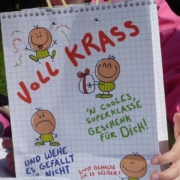Learning German can daunting, fun and frustrating all at once. It is a test of patience and will, but it many cases it is not as difficult as it seems.
For this reason we have put together a balanced list of 5 reasons by which learning German can be really hard, and 5 reasons by which it isn’t that much.
Five reasons why learning German is hard…
1. Because you can say the same thing in about 500 different ways
German has a very rich lexicon. This is partly due to its incredible ability to create new terms through Wortbildung, literally, the building of words. As a sort of creative exercise, different words and nouns can be joined with one or more suffixes. Furthermore the French cultural domination of the 18th century spoiled the German language and influenced the expression of certain concepts from the time. When then Romanticism and its underlying nationalist ideology spread throughout Europe in the 19th century, certain linguists quite literally invented 100% German words to convey those same expressions (some examples include: division= Aufteilung, definition= Bestimmung…).
The result? Several things in German can be said with two completely different words that actually have the same meaning. The choice of the word will then depend on the context and stylistic criteria. Unfortunately, this richness in choice applies also to whole sentences and expressions.
Thus even if you have been studying German for 10 years and know of 5 different ways to ask “how are you?”, be sure that a native speaker will come to you one day and employ that 6th way that you couldn’t even begin to imagine it existed.
2. Because the spoken language is terribly different from the written one
Yes, this is probably the most interesting, not to say terribly frustrating, aspect of German: no matter how well you know ALL the possible grammatical rules, the gender of thousand of nouns, the sentence structure etc… most likely the you won’t be able to understand one thing from your first conversations with a German, in particular in informal situations. The spoken language has in fact a name for it’s own, the so called Umgangssprache (vehicular language). Its lexicon has even been assembled in dictionaries, and holds the peculiarity of being transversal to dialects.
What characterizes the spoken language is that array of small words that have absolutely no meaning on their own and that Germans use to give a tone to the sentence (a bit like hand gestures for Italians) such as mal, schon, halt, doch… The use of these words will immediately separate a native speakers from who, regardless of how fluent they may be, learned German as a second language. There is then the tendency to ask „Wo kommst du her?“ and „Wo gehst du hin?“ as opposed to the common „Woher kommst du?“ and „Wohin gehst du?“. To our delight, Germans also like to liven up the language with particular expressions and to the universally known “Wie geht’s?” they will probably prefer a „Wie läuft’s?“ or a „Wie ist es?“…

3. Because there are three genders for nouns and with the exception of a few rules, the choice is absolutely random
This is possibly the greatest shock when starting to learn German: to find out that not only there are three different genders (masculine, feminine and neutral), and only few, vague rules (words that end in -ung are all feminine, those ending in -er are usually masculine), but most importantly, that the gender is not always dependent on the word structure, but on some completely random and unexplainable criteria. More than trying to find a logical reason behind the fact that a girl, for instance, is neutral (das Mädchen), the advice is to just accept it and move on. The same applies for plural.
The result is that unlike other languages, where it is pretty much enough to learn a word and move on, in German you’ll have to simultaneously learn it’s gender and it’s plural form. A mental violence, basically.
4. Because certain sounds are really hard to pronounce
Some have made it. This story takes the contours of a legend because certain sounds in German are really, really hard to pronounce. Some have a difficult time with the ch (not to be confused with the sch!) of which there are actually two different versions: the one found after vowels as a, o, u (Dach, Buch, Loch, in phonetic x) and the one found after the interior vowels i, e, ä, ü, ö (ich, Brecht, lächeln, Löcher, Bücher in phonetic ç). If you never noticed don’t worry, it’s normal, Germans themselves probably don’t even realize. One other fascinating sound is the guttural r, the one that departs from that unknown angle of the throat and that completely changes the sound of words like Brot.
5. Because we can’t accept that some verbs can be separated and that a piece of that verb has to be placed at the end of a sentence
Yes, when looking on the dictionary you’ll find a “full” word with a certain meaning, such as ausgehen = to go out, but in everyday sentences that same word will be split in two and the suffix will go at the end. Why? Who knows. Episodes in which you’ll find yourself translating a sentence and happily think to have understood what verb it is, just to find out that you actually missed a “piece” of it, will be very recurrent. And your brain will trip every time you’ll try to converse and have to think of that small element.

Photo: “Schnecken Schlecken” © Andreas: https://www.flickr.com/photos/124330160/ – CC BY SA 2.0
…and 5 reasons for which it isn’t that hard after all
1.It’s a very logical language
It’s true, German has several grammatical rules, but few exceptions. Once you learn the rule you will unlikely have unpleasant surprises.
2. Because there are few pronunciation rules
Except for the difficulty of the sounds aforementioned, one can’t say that German has tough pronunciation rules. Unlike English, for instance, where every word is pronounced in its own way or French, where to rules are so severe and dictations are done even in the most progressed course levels. In German the only sounds that change are certain diphthongs (such eu= oi and ei=ai) and the v which is read as f. For the rest, pretty much all the words are pronounced as they are written. And this is surely something worth mentioning…
3. Because nouns are recognized due to the capital letter
Even if you never studied this language, surely you may have noticed in for instance instruction manuals that several words in German are written with a capital letter. Those are nouns: common or abstract these may be, in German they always have a capital letter. This way of doing resides to the times of Luther and it has been contested for long yet never abandoned: Germans are too convinced of the enhanced readability of a text.
4. Because German has rules to which one can abide to, whereas in English the grammar is more ‘flexible’, so to say
Although English is one of the most learned and used languages globally, the English grammar remains a mystery to much of the native and foreign speakers alike. To this day English has no academy (unlike French’s Académie française or the Spanish’s Real Academia Española), and debates on verb tenses are very much alive. With German it’s easier, you have the rules and you ought to respect them. They might not always ‘make sense’, but at a certain point the the inner struggle fades.
5. Because you don’t have the gerund and the duration form
In English the dilemma on whether to utilize the gerund or not (i.e. “What do you do”? vs “What are you doing?”) is unresolved. The absence of such in German simplifies our life, not to mention that the (in)famous duration form is nonexistent. So, if you’ve been eating for the past hour you will simply say “Ich esse seit einer Stunde“. Simple and concise.
—-
If you are starting to get intrigued by the German language, take a look at the German courses that Berlino Schule organizes.







